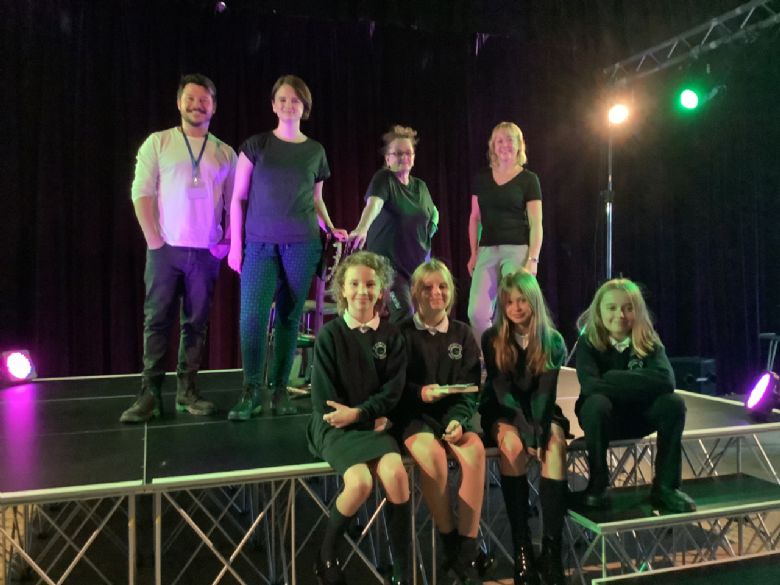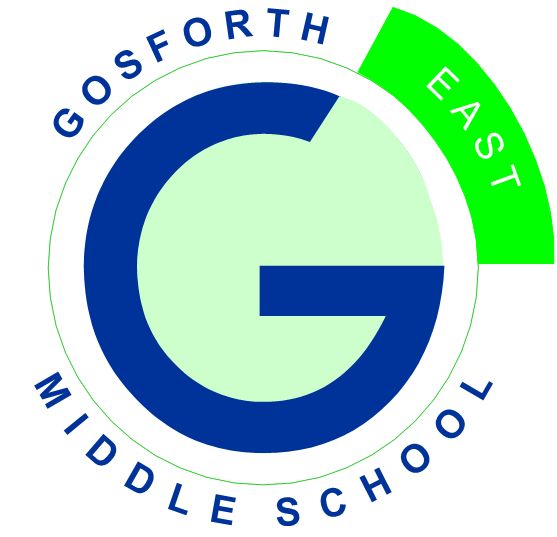English

Northumberland Theatre Company performed Shakespeare's 'Macbeth' to Y6 and Y7, September 2022.
Press Club interviewed the cast - look out for the article in our next newsletter!
English at GEMS
Curriculum Intent
‘Pupils must learn to read then read to learn.’
At GEMS we understand that reading is the key to unlocking learning potential and reading is celebrated across our school. Our aim is for pupils to not only find reading a pleasure… we want reading to be something they cannot get enough of... something that they are keen to share with their care givers, teachers, and peers. Every pupil is encouraged to read widely at school, and at home, and to share their reading with enthusiasm.
English at GEMS is taught through texts. Our English curriculum is sequenced to develop pupils understanding of the world, with reading at the heart. Our teachers aim to secure pupils with cultural and contextual knowledge in English lessons, providing learning that introduces children to ideas and events from the past and present, challenging them to be critical thinkers. All pupils are encouraged to explore ideas about humanity through reading: we want our pupils to be people that value empathy to challenge how our world is and how they want it to be.
English is a core subject, and we value its importance within the broader curriculum. Disciplinary literacy is implemented across our school: information is presented as text; word banks are used for high frequency words and key vocabulary; words of the day/week/topic; and regular handwriting/spelling practice of key words. We have accountable reading routines and echo/paired reading routines in place to ensure all pupils are actively reading and so adults frequently listen to pupils read and provide monitored practice. As well as writing across the English curriculum, there is the expectation that pupils will complete longer written pieces regularly in science, history, RE and geography.
Continuing literacy professional development, including a two-year programme to improve writing; training courses in phonics and literacy across the curriculum; Herts for Learning Reading Fluency Project; and their own research-based projects means that staff are always reflective and moving forward to ensure high quality education for the children at GEMS, with reading as a key focus.
Learning in English is sequenced to ensure that all pupils gain transferable literacy skills. “Reading and writing float on a sea of talk,” says James Britton and so tell us at GEMS, we have developed a sequence of learning that allows a broad study of texts, with speaking and listening opportunities and vocabulary understanding embedded throughout. Language understanding is developed through high quality texts, Word of the Day, and pre-teaching vocabulary to ensure all pupils can access the challenging texts studied.
Pupils study a variety of texts of increasing complexity and challenge, including novels, plays, poetry, short stories, and non-fiction. Texts are studied for reading comprehension and analysis as well as being used for exemplars of proficient writing. Our English planning ensures that at least one novel, Shakespeare play, and poetry unit are studied each year; pupils are exposed to a variety of texts, from poetry to 19th century prose to contemporary fiction. The texts are chosen to suit our school context and reviewed regularly to suit the cohort.
A range of writing is covered each year: creative/descriptive, narrative, instructions, persuasive, explanation, recount, report, balanced argument, and poetry writing. Real life examples aid the development of writing skills. We want all pupils to be able to analyse the author’s craft: exploring content and organisation, language, sentence types and punctuation use to improve their own writing. Handwriting, phonics knowledge, spelling, punctuation, and grammar are taught explicitly as well as being linked with the text being studied.
The impact of high-quality teaching and well sequenced learning is demonstrated in the success of our pupils in their SATs results and in the fact that they leave GEMS with a strong understanding of how novels, plays, poetry and non-fiction shape the world. The skills developed in reading analysis, writing, and spoken English during their time at GEMS ensure they are ready for their next steps in learning at GCSE as well as unlocking success in their future careers.
How students are supported in English
Smaller class sizes allow support for all pupils, with most English classes having 20-25 pupils. As part of our Covid catch up, we employed an additional English specialist, which allows smaller classes in both KS2 and KS3. English is taught in mixed ability groups. Mixed ability works because of the high-quality education our teachers provide: they use scaffolding effectively, change in-class groupings and offer a supportive class environment where all pupils are expected to participate and engage in discussion, reading and writing to complete the challenging work set. We teach with high expectations, ensuring that the curriculum is accessed by every child in our care.
Nurture groups in every year group, taught by our SENCo and Assistant SENCo, provide extra support for pupils with additional needs, with the aim to reintroduce the children back to the main classes before the end of Year 8, ready for them moving on to high school.
We have a challenge group in Year 5 and in Year 6, taught by English specialists. These groups push borderline pupils to meet exceeding age-related expectations.
Specific approaches to support students in English:
-
Reading Fluency Project
-
IDL
-
Writing groups
-
Library sessions
-
Accountable reading
-
Paired reading
-
Echo reading
-
Active listening
-
Effective use of LSAs
-
Unseen text analysis
-
PEE (Point, Evidence, Explain)
-
PETAL (Point, Evidence, Technique, Analysis, Link)
-
SLIME (Structure, Language, Imagery, Meaning, Effect)
-
Guided reading
-
Guided writing
-
Writing challenges
-
Verbal feedback
-
Live marking
-
Modelling
-
Small group work
-
Word of the Day
-
Pre-teach vocabulary
-
Handwriting practice
-
Spelling strategies and phonics
-
Word banks
-
Sentence stems
-
Self-reflection
-
Fix-it tasks
Homework activities are provided for our pupils via Seesaw and in KS2 pupils access Read Theory, Spelling Shed and have CGP books. We have a list of useful websites for additional at home support, which can be found under the links section.
Reading is the key to unlocking learning potential and reading is celebrated across our school. Pupils are expected to have a reading book with them at all times in school and reading for pleasure is encouraged by all staff. We have termly recommended reads and half termly reading challenges - further details can be found under the Reading for Pleasure section of our website and by searching for the hashtag #GEMSReads on our Twitter page.
Assessment
Progress and attainment are checked every lesson through discussion, targeted questioning and marking of pupils’ work. Regular live feedback and timely marking of assessed pieces ensures that pupils know what they need to do to improve. Pupil progress sheets are completed after each assessment and literacy targets are reviewed and set termly. Literacy targets are in English books and in pupils’ planners so these skills can be supported across the school.
In Key Stage 2 pupils complete half termly tests in reading comprehension, GPS (Grammar, Punctuation and Spelling) and a spelling test using CGP tests and past SATs papers. Pupils complete two assessed pieces of writing each half term and speaking and listening activities are embedded, including regular drama work, and performing poetry learnt by heart.
In Key Stage 3 teachers assess pupils’ reading analysis skills and writing throughout each half term. Pupils complete GCSE style practice papers for reading and writing termly. Drama and other speaking and listening activities are embedded, including a whoosh for every Shakespeare play studied, debates, reading journal presentations and talks on heroes and challenging issues. Pupils display their empathy to challenge how our world is and how they want it to be.
Enrichment Opportunities
Pupils have extensive opportunities for enrichment throughout their time at GEMS. We believe that all pupils should visit the theatre and see performances in school too, from Frank Cottrell-Boyce to Kwame Alexander at Newcastle Theatre Royal to Northumberland Theatre Company performing Shakespeare’s Macbeth in our school hall. Pupils thoroughly enjoy our theatre and cinema trips, we take part in writing workshops, and we facilitate many talks from authors, including fantastic workshops online with Michael Rosen. Many writing and drama opportunities take place throughout the academic year, from Live Tales to Lit and Phil competition to the National Reading Champion Quiz. We celebrate National Poetry Day, World Book Day/Week and Shakespeare Week.
Book Clubs are highly subscribed to in every year group and pupils are encouraged to join throughout the year. Each book club meet weekly to share their love of reading and explore the author’s craft in depth. Some of the books read include Boy in the Tower, The Nest, Smart, Looking at the Stars, Ghost Boys, Jessica’s Ghost and A Monster Calls. Pupils have visited bookstores and chosen books for the clubs and for our school library.
Press Club work with Mrs Leahy to report key events happening at our school. Pupils take their roles seriously, including interviewing visitors, to provide accurate accounts of the enrichment, events and learning happening at GEMS each half term. The newsletters are shared with pupils, care givers and staff.
In 2022, Mr Gray started a creative writing club for all ages. Pupils meet weekly to share their love of writing, with more children joining throughout the year.
Further details of the enrichment opportunities linked to English and reading can be found under the Reading for Pleasure section of our website and by searching for the hashtag #GEMSReads on our Twitter page.
Useful Links
Websites to support learning at home:
Read Theory https://readtheory.org/
Spelling Shed www.spellingshed.com
SPAG spag.com
BBC Bitesize www.bbc.co.uk/schools/ks2bitesize/english
I am learning www.iamlearning.co.uk
Spelling Frame spellingframe.co.uk
English Programmes of Study https://www.gov.uk/government/publications/national-curriculum-in-england-english-programmes-of-study/national-curriculum-in-england-english-programmes-of-study
